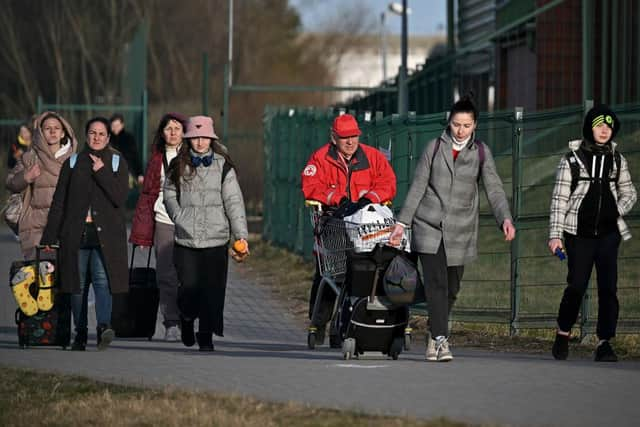Ukraine-Russia: Volodymyr Zelensky says Ukraine would consider neutrality as peace talks continue
He told independent Russian journalists on Sunday that the issue of neutrality - and agreeing to stay out of Nato - should be put to Ukrainian voters in a referendum after Russian troops withdraw, adding that Ukraine wanted “peace without delay”.
However, this morning, Ukraine said it will not open humanitarian corridors from its cities due to warnings of Russian "provocations" on routes. Corridors had been set up to allow civilians to leave some towns that are surrounded by Russian forces, however, have been plagued with reports of attacks on civilians trying to flee. Officials have warned of a humanitarian “catastrophe” in the besieged city of Mariupol.
Advertisement
Hide AdAdvertisement
Hide AdMr Zelensky said that a vote could take place within a few months once Russian troops leave. Russia quickly banned the interview from being published.


Roskomnadzor, which regulates communications for Moscow, issued the ban on Sunday, saying there could be action taken against the Russia-based media outlets that took part, which included "those that are foreign media outlets acting as foreign agents".
Mr Zelensky responded by saying Moscow was afraid of a relatively short conversation with journalists. "It would be funny if it weren't so tragic," he said, according to the Ukrainian news agency RBK Ukraina.
Mr Zelensky also said Ukraine's priorities at the Ukrainian-Russian talks in Turkey this week will be "sovereignty and territorial integrity".
"We are looking for peace, really, without delay," he said. "There is an opportunity and a need for a face-to-face meeting in Turkey. This is not bad. Let's see the outcome."
This week, he said, "I will continue to appeal to the parliaments of other countries" to remind them of the dire situation in besieged cities like Mariupol.
Meanwhile, German Chancellor Olaf Scholz said that neither Nato nor US President Joe Biden aim to bring about regime change in Russia.
Mr Biden said of Mr Putin during a speech on Saturday that "this man cannot remain in power". The White House and other US officials rushed to clarify that Mr Biden was not actually calling for Mr Putin to be toppled.
Advertisement
Hide AdAdvertisement
Hide AdAsked during an appearance on German television on Sunday whether Mr Putin's removal is in fact the real aim, Mr Scholz replied: "This is not the aim of Nato, and also not that of the American president."
Mr Scholz added: "We both agree completely that regime change is not an object and aim of policy that we pursue together."
Asked whether Mr Biden made a dangerous mistake with his comment, Mr Scholz replied: "No." He said that "he said what he said" and Secretary of State Antony Blinken also had clarified that he was not talking about regime change.
Mr Scholz last month announced a big increase in German defence spending. On Sunday, he confirmed a report in a German newspaper that the government is considering acquiring a missile defence shield along the lines of Israel's "Iron Dome".
A message from the Editor:
Thank you for reading this article. We're more reliant on your support than ever as the shift in consumer habits brought about by Coronavirus impacts our advertisers.
If you haven't already, please consider supporting our trusted, fact-checked journalism by taking out a digital subscription.
Comments
Want to join the conversation? Please or to comment on this article.
